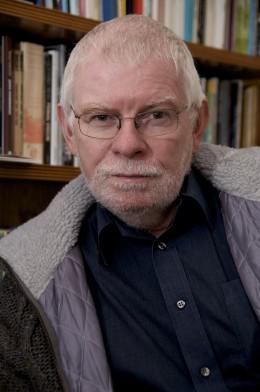Poet
Gerard Smyth

Gerard Smyth
(Ireland, 1951)
© Karl Smyth
Biography
Gerard Smyth was born in Dublin in 1951. His first two books were published by the New Writers’ Press when he was eighteen years old. His main collections are World Without End; Loss and Gain; Painting the Pink Roses Black; Daytime Sleeper; A New Tenancy; and The Mirror Tent. His selected poems will be published in 2009. For most of his professional career he has worked as a journalist with The Irish Times where he is now the Managing Editor. He lives in Dublin.
Thematically and stylistically, Smyth is the only inheritor of the poetic patrimony of the great urban Irish poet, Thomas Kinsella, though his work has an additional psalm-like, familial, warmth that has impressed many critics and listeners. Smyth finds power in the pieties of family and love as well as in the long anxieties of urban work and Irish industrial history. Politically, he is a child of Lemass rather than deValera; he has escaped from an Irish tedium well described:
In those days soon after mid-century
the dead air of Sunday was like a sedative.
It settled on the Dublin Mountains
and Garden of Remembrance.
(from ‘Mid Century Sunday’)
At the beginning of his career, in the late 1960s, Smyth’s work emerged as part of the modernist and modernising generation of Michael Hartnett, Michael Smith and Brian Lynch. New Writers’ Press published The Flags Are Quiet (1969) and Twenty Poems (1970), while another modernist press, Tara Telephone, published Orchestra of Silence (1971). It was those early works, of reticence and minimalism, that prompted Michael Hartnett to praise him lavishly and claim that Smyth would do in poetry what James Joyce had done for Dublin in prose. As late as 2007, the distinguished modernist poet James Liddy called Smyth “the chronicler of Irish fate”. That fate is a complex one, more than the Ireland of the cross-roads, more than the place of ambush and pilgrimage. In A New Tenancy (Dedalus Press, 2004) he walks the familiar Dublin streets (“Twice a day I carry my soul over water”) and ingests that rooted but complex multi-cultural material of a modern city:
When I first came to the footbridge
at the lock, as a child
with fishing net and pinkeen pot,
it was through Little Jerusalem:
the avenues of exile,
past the synagogue that is now the mosque.
(from ‘Portobello Bridge’)
With ‘In the Noonday Yard’, Kinsella-like in its coolness and precision, Smyth continues that act of restoration through description:
A zinc bucket rattles the wind.
And billowing like a length of silk
a nettlebed crowns the golden dungheap.
That fidelity to Dublin, a place of synagogue and cobblestone, is part of this poet’s distinctive signature. In other books, too, in Painting the Pink Roses Black (1986), Daytime Sleeper (2002) and The Mirror Tent (2007), the poems alternate between “a nugget of coal/ and salt: the double talisman/ to protect our four walls and fire-hearth” of ‘Housewarming’ through to the far-distant house of Elias Canetti where Smyth meditates upon the life of political commentators, from Canetti to Dick Walsh, the famous political commentator of Smyth’s own newspaper:
I think of you as the man
Who followed the Danube: a journey of crossings
Through the geographer’s landscape.
(from ‘Geographer’s Landscape’)
In his more recent books, A New Tenancy and The Mirror Tent, Smyth has extended his poetic range greatly, both in method and theme. Translated into Romanian and a traveller in and out of Bucharest (with its “carnivalesque dog packs”) he has been able to look both outward and backwards, searching new themes, making comparisons, unsettled in his homecomings. Like a number of excellent Irish poets whose crucial work as editors obscure the value of their accumulated work in poetry, Gerard Smyth has generally been overlooked and undervalued as a writer. His recent election to membership of Aosdana, the artists’ body, was part of the Irish cultural milieu catching up with his achievement. But Smyth remains a sure and sure-footed voice of the cobblestones and lanes of inner, artisan and industrial Dublin. The tidal ebb and flow of Irish and European history does wash around his poems, but the resonant and haunted Dublin poems themselves are like well-cut Venetian quays; loose but standing, and firm for the soul to walk upon twice-daily over water.
© Thomas McCarthy
Select BibliographyPoetry
World Without End, New Writers’ Press, Dublin, 1977
Loss and Gain, Raven Arts Press, Dublin, 1981
Painting the Pink Roses Black, Dedalus Press, Dublin, 1986
Daytime Sleeper, Dedalus, Dublin, 2002
A New Tenancy, Dedalus, Dublin, 2004
The Mirror Tent, Dedalus, Dublin, 2007
Links
Gerard Smyth’s author page on the Dedalus Press website
A review of The Mirror Tent on www.geraldengland.co.uk
Poems
Poems of Gerard Smyth
Sponsors
























